Are R&D Tax Credits Available in Arizona?
Yes. The state of Arizona Research and Development (R&D) Tax Credit is a valuable benefit for companies developing new products and services. The Arizona R&D tax credit provides a tax credit for increasing qualifying research activities in the state of Arizona including research funded by taxpayers at state universities. Arizona has both refundable and nonrefundable credit. Arizona leverages the federal section 41 rules regarding the qualification of qualified research activities. The amount of the credit is based on the excess, if any, of the qualified research expenses and basic research payments for the taxable year over the base amount as defined in section 41(c) of the internal revenue code and is computed as follows:
- If the excess is $2.5 million or less:
- For taxable years beginning before December 31, 2030, the credit is equal to 24% of that amount.
- For taxable years beginning from and after December 31, 2030, the credit is equal to 20% of that amount.
- If the excess is over $2.5 million:
- For taxable years beginning before December 31, 2030, the credit is equal to $600,000 plus 15% of any amount exceeding $2.5 million.
- For taxable years beginning from and after December 31, 2030, the credit is equal to $500,000 plus 11% of any amount exceeding $2.5 million.
- In order to qualify for the refundable portion of the tax credit, a company must qualify for the regular tax credit and employ less than 150 full-time employees.
- You must apply to Arizona Commerce Authority (ACA) and receive a Certificate of Qualification (Certificate) to be eligible to receive a refund.
- The refundable amount is 75% of the allowable credit that exceeds the taxpayer's tax liability. The remainder of the excess credit amount is waived if the taxpayer elects a refund.
- Arizona has capped the refundable amounts for all taxpayers to $5 million in any calendar year. The refunds will be allowed by the Arizona Commerce Authority on a first-come, first-served basis.
- The amount of any additional credit for university-related research is not refundable and may be carried forward for the next 5 consecutive years.
- For tax years beginning before 2022, unused credits can be carried forward for the next 15 consecutive years.
- For tax years beginning after 2021, unused credits can be carried forward for the next 10 consecutive years.
Arizona R&D Tax Credit Case Study
A manufacturing company in Phoenix that creates cylinders for the extraction and storage of different coolants and chemicals qualified for a substantial credit. The company claims R&D credits each year for the development activities of its engineers. This project involved a multi-year study.
The Company qualified for the federal R&D Tax Credits of $255,000 and an additional $306,000 in Arizona state R&D Tax Credits.
|
FEDERAL
|
ARIZONA
|
|||||
|
Year
|
Total QREs
|
Credit
|
Total QREs
|
Credit
|
||
|
2021
|
$750,000
|
$75,000
|
$750,000
|
$90,000
|
||
|
2020
|
$700,000
|
$70,000
|
$700,000
|
$84,000
|
||
|
2019
|
$650,000
|
$65,000
|
$650,000
|
$78,000
|
||
|
2018
|
$450,000
|
$45,000
|
$450,000
|
$54,000
|
||
| Total | $2,550,000 | $255,000 | $2,550,000 | $306,000 | ||
You can read more about this Arizona case study here.
Four-Part Test
Qualified research activities are defined by the four-part test outlined below
Technological in Nature
Activities must fundamentally rely on the principles of physical or biological science, engineering, or computer science.Permitted Purpose
Activities must be performed in an attempt to improve the functionality, performance, reliability, or quality of a new or existing business component.Eliminate Uncertainty
Activities intended to discover information that could eliminate technical uncertainty concerning the development or improvement of a product.Experimentation
All activities must include a process of experimentation including testing, modeling, simulating, and systematic trial and error.Research and Development Tax Insights
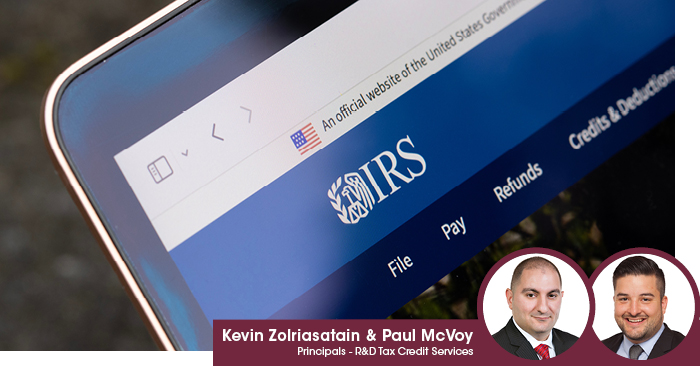
R&D Expensing is Back: What the Section 174 Fix Means for Your 2024 Tax Strategy
07/08/2025Follow KBKG on Social Media Linkedin Facebook X-twitter Youtube By Kevin Zolriasatain and Paul McVoy | Principals, Research & Development Tax Credits For the last two years, companies conducting qualified research have been burdened with an unfavorable tax provision that has made Research and Development (R&D) investments more expensive, at precisely the wrong time. That’s … Read More
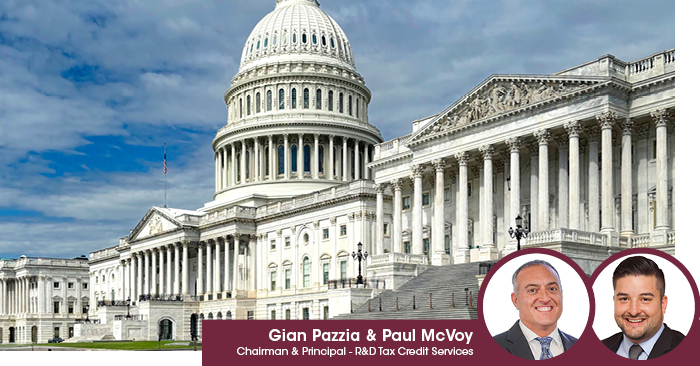
KBKG Tax Insight: One Big Beautiful Bill – 2025 Tax Changes and Summary Chart
07/03/2025Follow KBKG on Social Media Linkedin Facebook X-twitter Youtube By Gian Pazzia and Paul McVoy | Research & Development Tax Credits Breaking News – July 4, 2025 On July 4th, President Trump signed the “One Big Beautiful Bill Act” (OBBBA), marking a significant overhaul to federal tax policy. The signing reflects a major pivot in legislative … Read More
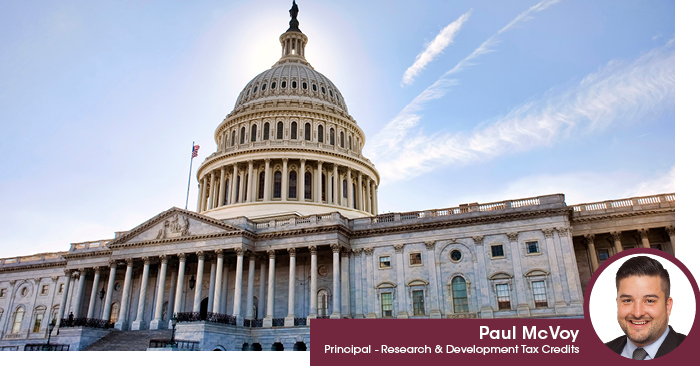
SALT Workaround Preserved, Real Estate & R&D Expensing Win Big. What Businesses Need to Know
06/30/2025Follow KBKG on Social Media Linkedin Facebook X-twitter Youtube By Paul McVoy | Principal, Research & Development Tax Credits The reconciliation process for the “One Big Beautiful Bill” (OBBB) has entered its final phase, and in the past three days, Senate Republicans cleared a key procedural hurdle and released updated text that could reach the Senate … Read More
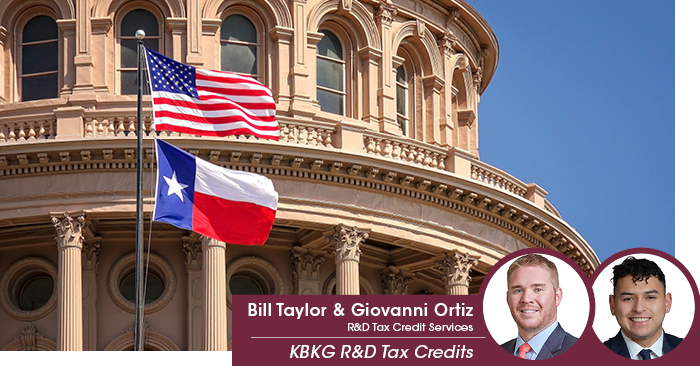
Texas Enhances R&D Credit, Allowing Companies to Claim More
06/27/2025By Bill Taylor and Giovanni Ortiz | Research & Development Tax Credits On June 1, 2025, Texas lawmakers passed Senate Bill 2206 legislation that significantly enhances the state’s R&D Tax Credit structure. The Governor signed this bill into law on June 17, 2025. Effective for franchise tax reports due on or after January 1, 2026, … Read More
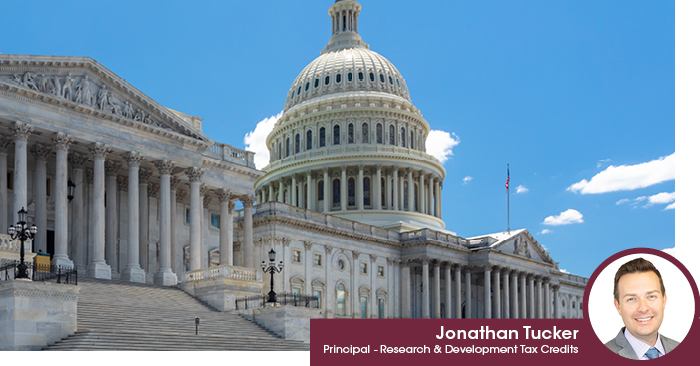
Retroactive and Permanent R&D Expensing Restored Under Proposed Senate Legislation
06/17/2025Follow KBKG on Social Media Linkedin Facebook X-twitter Youtube By Jonathan Tucker | Principal, Research & Development Tax Credits The Senate Finance Committee has proposed a significant change to the way U.S. businesses deduct their research and development (R&D) expenses. If passed, the bill would reverse a major change that took effect in 2022 based on … Read More
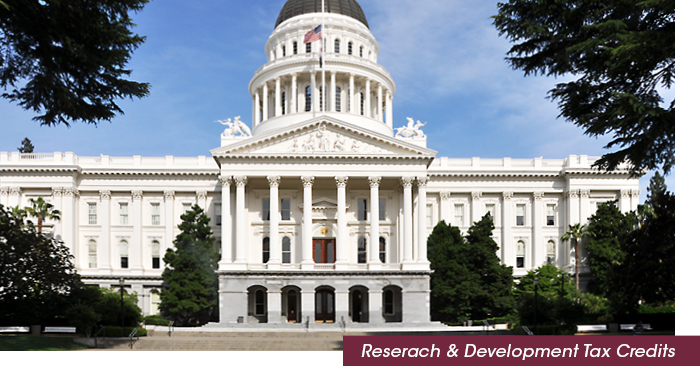
California Senate Bill 711 Proposes Simplified R&D Credit Method
06/10/2025Follow KBKG on Social Media Linkedin Facebook X-twitter Youtube By Tetyana Guguchkina, Elise Rhee, & Michael Maroney | Research & Development Tax Credits California is poised to overhaul its R&D Tax Credit with Senate Bill 711 (SB 711), which proposes replacing the state’s Alternative Incremental Research Credit (AIRC) with a new Alternative Simplified Credit (ASC) … Read More
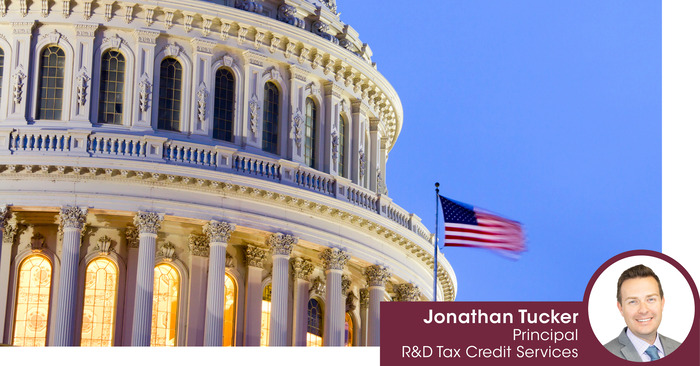
House Narrowly Passes Major GOP Tax Bill 215–214, Senate Signals Revisions Ahead
05/22/2025Follow KBKG on Social Media Linkedin Facebook X-twitter Youtube By Jonathan Tucker | Principal, Research & Development Tax Credits Just after midnight on Thursday, May 22, 2025, a full House debate on the multi-trillion-dollar tax bill began, and the House narrowly passed this sweeping tax and spending package dubbed the “One Big Beautiful Bill Act” with … Read More
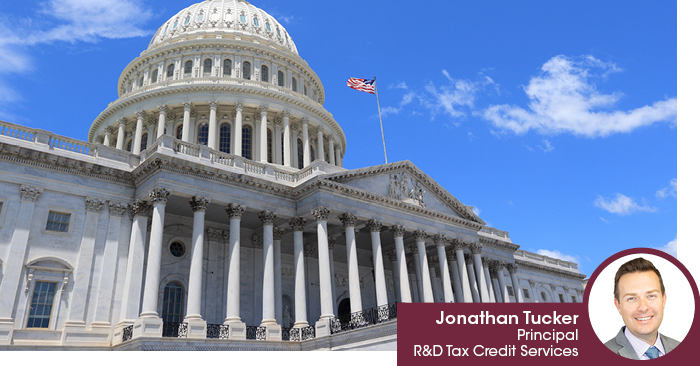
House Committee Advances Major GOP Tax Bill Amid Internal GOP Divisions
05/19/2025Follow KBKG on Social Media Linkedin Facebook X-twitter Youtube By Jonathan Tucker | Principal, Research & Development Tax Credits On May 18, 2025, the House Budget Committee narrowly approved a major tax and spending package dubbed the “One Big Beautiful Bill Act” with a 17-16 vote. Four Republicans voted “present,” highlighting growing tension within the party … Read More
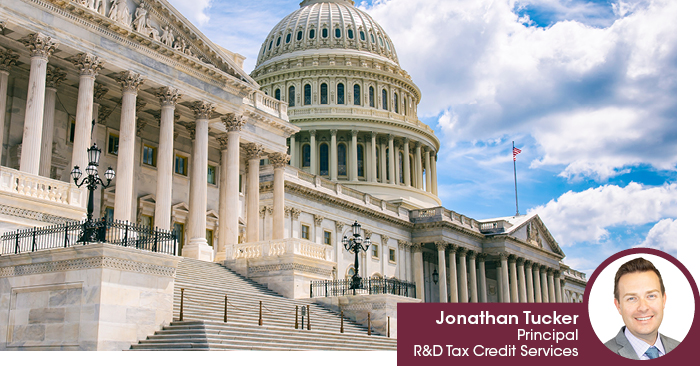
Senate Reacts to Key Provisions from House Tax Bill, Eyeing Permanent R&D Expensing
05/16/2025Follow KBKG on Social Media Linkedin Facebook X-twitter Youtube By Jonathan Tucker | Principal, Research & Development Tax Credits Important developments recently came out of Congress related to the House’s ongoing reconciliation efforts, specifically around tax provisions that impact businesses directly, most notably, research and development (R&D) expensing. At a recent Tax Council Policy Institute conference, … Read More
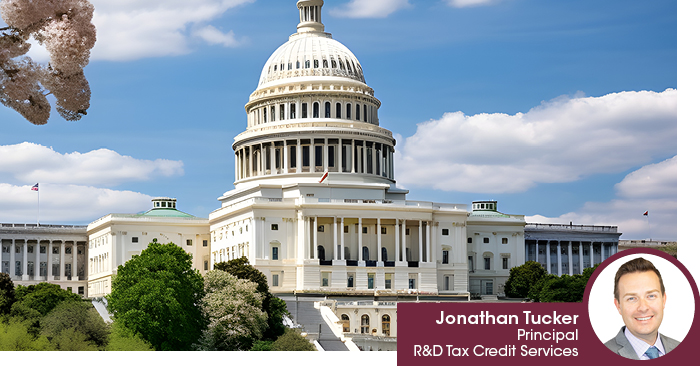
House Tax Bill Prioritizes 174 R&D Amortization Fix, Bonus Depreciation, SALT Cap, and more
05/13/2025Follow KBKG on Social Media Linkedin Facebook X-twitter Youtube By Jonathan Tucker | Principal, Research & Development Tax Credits On May 12, 2025, the House Ways and Means Committee released a larger text than what Chairman Jason Smith (R-MO) released on May 9 for proposed tax legislation as part of the FY 2025 budget reconciliation process. … Read More


